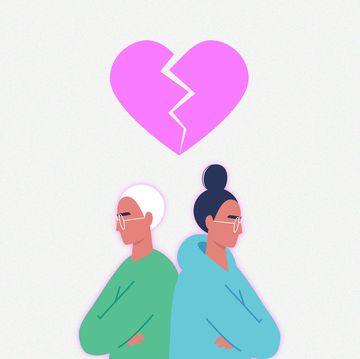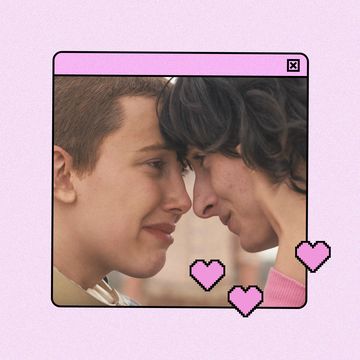OK, so you’re thinking about having sex for the first time and you have so many questions. Understandable! There’s a lot of information to consider, and sex ed class doesn’t always cut it. You may be wondering: Does losing your virginity hurt? (And um, how much?) How do you know you’re ready to have sex? What even counts as sex? Is your first time going to be as awkward as some people make it sound, or will it be just as dreamy and spontaneous as our favorite rom-coms make it look? Everyone’s experience with first-time sex is different — and the definition of “losing your virginity” varies from person to person — but between what you hear from friends and see as you scroll through social media, it’s important to have all the right facts.
There are a lot of things no one tells you about losing your virginity, and since it’s a pretty big decision, you want to make sure you’re 100 percent ready and prepared. (Did you know that condoms are not 100 percent effective?) You probably feel a little awkward asking your parents, siblings, doctors, and maybe even some of your besties for advice about your first time. So to help you figure out the answers to your most ~personal~ questions, we had Amber Madison, author of Hooking Up: A Girl’s All-Out Guide to Sex & Sexuality, explain everything you need to know about having sex for the first time. Here, the answers to all the questions you might be too embarrassed to ask.
It seems like everyone says that sex is fun and feels good. Is that true?
Yes, sex can be fun and pleasurable, but it’s not true that sex feels good in all situations, all the time. Sex is a learning curve for most, and you may not know exactly what you’re doing the first time. That’s completely OK, but getting to know what you and your partner like and don’t like helps make the experience more comfortable and enjoyable.
It’s possible that you won’t orgasm for the first few (or dozen) times having sex. One Brown University study reports that one out of three people with vulvas have trouble reaching orgasm when having sex with a partner. Another 2018 study found that 10 to 40 percent of women have difficulty orgasming during sex. Masturbation is a great way to explore your body and discover what works for you, as can trying new positions with your partner. Communication is key here.
My partner and I have been talking about having sex. Will it hurt? I’m afraid something will go wrong.
It’s normal for sex to cause some pain or physical discomfort the first time. Being nervous can cause your muscles to clench, and if you and your partner haven’t worked up to intercourse by making out and touching each other first, your body may not be aroused — and that can make things even more uncomfortable.
When you’re aroused, your vagina lubricates to prepare your body for sex, but without lubrication, there can be friction, which can cause pain. Nerves can interfere with your ability to get aroused, and you and your partner may get aroused at different speeds. To make the experience a lot more comfortable, you could try using a personal lubricant.
But here’s the thing: If you’re really worried about doing it, then maybe you’re not truly ready. Having sex is a big responsibility because yes, there is always a chance something could go not as planned. Even if you use protection, the condom could break, and no birth control is 100 percent foolproof. There’s also the risk of sexually transmitted infections (STIs). When you’re ready to have sex, you should feel excited, secure, and safe… like the way you feel before a rollercoaster — good scared, not bad scared.
It’s important to note that some medical conditions can make sex painful, like vaginal infections, STIs, and endometriosis, according to the Cleveland Clinic. If you start having sex and it feels like something is wrong or consistently painful, visit your gynecologist. And remember: You can stop having sex at any point, whether it hurts, is uncomfortable, or you just change your mind.
My partner and I have been going out for almost several months and have only gotten to third base. Is this normal?
Deciding to take any sexual step should be a mutual decision, not something that you do just because your partner wants to. There is nothing wrong with taking things as slow as you need to. (This may mean dating someone for months or years until having sex.)
If you enjoy hooking up and doing things other than sex, then keep doing that. It’s totally normal to prefer steamy make-out sessions. If at any point you do want to have sex, just be sure that you’re doing it because you really want to, not because you feel like you should. There’s no timeline to follow or special occasion to mark when you need to have sex. Take your time and wait until you know how to have sex safely, are truly comfortable with doing it, and understand what it means to both you and your partner.
Will having sex affect my relationship with my partner?
Having sex for the first time can bring you and your S.O. closer, but it can also test your relationship in a few different ways. First-time sex can be awkward and clumsy (yes, this is completely normal), so you two may need to have a deeper conversation about what you like and don’t like. This might be something you haven’t talked about before, and although there’s no right or wrong way to have sex, taking the time to get to know each other on an intimate level can help you both enjoy the experience better.
A late period, a questionable bump down there, and other uncertainties can also poke holes in your bond. So before you decide to hook up (any time, not just the first time), always ask yourself: Is our relationship strong enough to withstand the worst-case scenarios? In Seventeen’s “Seggs Ed” series, sex educator Haylin Belay suggests thinking about what sex means to you and your partner. Can you trust this person to treat you with total respect afterward? And most importantly, do you really want to do this? It’s normal to feel a little nervous, but you should feel excited, too.
You should never, never feel pressured into getting physically intimate — if your partner truly cares about you, whether or not you have sex won’t make or break your relationship. This is a big decision, and you need the *ultimate* gut-check.
What counts as “losing your virginity”?
You maybe have this equation in your head: Penis → Vagina = Virginity Lost. But that’s not the case. Virginity is less about vaginal sex, and more about a new physical experience with a partner. You can “lose your virginity” in several different ways, including oral and anal sex. As Belay explains in our “Seggs Ed” series, it’s better to frame these experiences as your “sexual debut” rather than “losing your virginity.”
But remember: No matter what kind of sex you’re having, you always need to use protection. Condoms and birth control, including the pill, implant, and IUD, all help to prevent pregnancy and STIs.
















